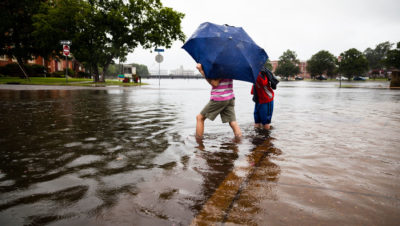Flooding due to high tide and heavy rainfall in Norfolk, Virginia in July 2017. Skyler Ballard/Chesapeake Bay Program
As global temperatures continue to rise, 100-year floods could become annual occurrences in parts of the United States, according to new research published in the journal Nature Communications. The increase in severe coastal flooding events by the end of this century will be due to rising sea levels and stronger, more frequent tropical storms and hurricanes, the study concluded.
The research, led by scientists at Princeton University and the Massachusetts Institute of Technology, examined flood risk for 171 counties along the U.S. East Coast and Gulf of Mexico. Historically, 100-year floods have been just that — an intense flooding event that happens once every 100 years, or has a 1 percent chance of happening in any given year. But scientists found that 100-year floods will become annual events in New England. In the U.S. Southeast and Gulf of Mexico, counties could experience such floods every one to 30 years.
To date, most coastal flooding analyses have looked solely at the impact of sea level rise on flood risk. But for this new research, the scientists combined the risk of rising seas with projected changes to coastal storms by the end of the 21st century. They hope the more comprehensive flood risk data can be used to create more accurate, targeted climate resiliency strategies, down to the county-level.
“For the Gulf of Mexico, we found the effect of storm change is compatible with or more significant than the effect of sea level rise for 40 percent of counties,” Ning Lin, an environmental engineer at Princeton University and lead author of the new study, said in a statement. “So, if we neglect the effects of storm climatology change, we would significantly underestimate the impact of climate change for these regions.”



